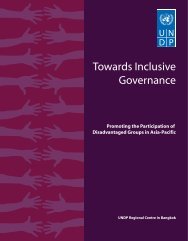Lessons Learned From Rights-Based Approaches in ... - HRBA Portal
Lessons Learned From Rights-Based Approaches in ... - HRBA Portal
Lessons Learned From Rights-Based Approaches in ... - HRBA Portal
Create successful ePaper yourself
Turn your PDF publications into a flip-book with our unique Google optimized e-Paper software.
Optional Protocols. However, as is common with many countries of the sub-cont<strong>in</strong>ent,<br />
there is a limited respect paid to the <strong>in</strong>ternational obligations voluntarily undertaken,<br />
<strong>in</strong>clud<strong>in</strong>g the ‘report<strong>in</strong>g’ imperative.<br />
The Role of Civil Society <strong>in</strong> Secur<strong>in</strong>g <strong>Rights</strong>: Aga<strong>in</strong>st such a backdrop, it is notable<br />
to mention that civil society <strong>in</strong> Bangladesh, particularly the non-governmental (NGO)<br />
sector, has sought to compensate for various deficits that characterize the lives of poor<br />
and vulnerable groups <strong>in</strong> access<strong>in</strong>g and realiz<strong>in</strong>g various rights, <strong>in</strong>clud<strong>in</strong>g the right to<br />
development. The <strong>in</strong>credible capital that these organizations br<strong>in</strong>g <strong>in</strong>to the country <strong>in</strong><br />
the form of funds and services is reflected <strong>in</strong> their size, range of activities,<br />
geographical spread and coverage. 5 In a country like Bangladesh, it not only shows a<br />
huge outreach to the people but also demonstrates the need for such activities. Many<br />
observers even state that the NGO movement (and the services they undertake) <strong>in</strong> the<br />
country are almost ak<strong>in</strong> to what the Government of a country undertakes - many<br />
NGOs have primary constituency bases that are larger than the local Government<br />
constituency base <strong>in</strong> many areas across the country. Most of the Bangladeshi NGOs<br />
subscribe primarily to poverty reduction as their ma<strong>in</strong> thrust of work and<br />
empowerment of the poor through group-related activities.<br />
There are broadly four types of NGOs present <strong>in</strong> Bangladesh 6 :<br />
i) The first type of organizations are basically ‘micro f<strong>in</strong>ance’ organizations like the<br />
Grameen Bank (GB) that place their ma<strong>in</strong> emphasis on the economic dimension of<br />
empowerment through a method of provid<strong>in</strong>g f<strong>in</strong>ancial services for the poor with a<br />
view to develop market access, enterprise development and economic accumulation.<br />
ii) The second type of organization focuses on social service delivery such as health,<br />
education and welfare - such services has helped to an extent <strong>in</strong> promot<strong>in</strong>g human<br />
capital <strong>in</strong> the context of the poor. The work of these types of organizations is reflected<br />
<strong>in</strong> the contributions of such NGOs like the Bangladesh Rural Advancement<br />
Committee (BRAC).<br />
iii) The third type of the organization (<strong>in</strong> general, they are known as “social<br />
development organizations”) are those that comb<strong>in</strong>e both of the previous two<br />
concepts. They have brought about a new dimension, which could be termed as the<br />
political dimension of empowerment. The work of such organizations is reflected <strong>in</strong><br />
the work undertaken by NGOs like the Rangapur D<strong>in</strong>ajpur Rural Services (RDRS).<br />
iv) The fourth type of organizations are called “social mobilization organizations”.<br />
These emphasize the importance of political empowerment through challeng<strong>in</strong>g the<br />
power structures and access<strong>in</strong>g justice by promot<strong>in</strong>g the rights of the people. They<br />
have a strategy of assert<strong>in</strong>g that the most effective way to br<strong>in</strong>g about change is<br />
through <strong>in</strong>fluenc<strong>in</strong>g the socio-political process.<br />
5 Ibid. Refer to footnote No. 3.<br />
There are around 22,000 NGOs <strong>in</strong> Bangladesh (Thornton et all, 2000); thus, 80% percent of the<br />
Bangladeshi villages have some form of NGO presence and about 35% of the country’s population<br />
benefits directly from their activities.5<br />
6 Ibid. Refer to footnote above<br />
16



